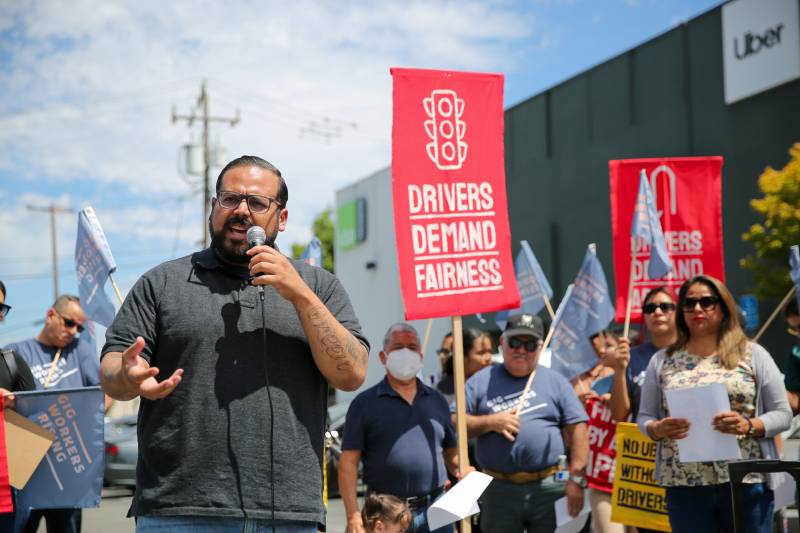Porras and other drivers said being deactivated costs them their livelihoods for days, weeks or months at a time, putting further financial and emotional strain on workers already feeling exploited by the gig economy.
The rally on Tuesday was part of a multi-city effort launching a new campaign called Activate Respect, calling out the company for processes the group wants revamped and rebalanced so drivers are prioritized more equally with customers.
It’s one of the latest campaigns by gig workers to demand better treatment, benefits, pay and protections from the giant companies running these markets, as the companies have pushed controversial legislation to avoid spending more on employee overhead.
The deactivations occur for a wide variety of reasons, drivers say, including minor customer complaints, which can sometimes be falsely filed by a rider seeking a discount or free ride from the company.
A driver could also be deactivated if the application’s facial recognition software isn’t able to match the driver’s face on a given day to their identification document on file.
Drivers said one of the biggest issues they face is not being able to get clear information about why they are being deactivated. They often say they receive boilerplate or vague notices.
Once deactivated, “it’s next to impossible to speak to a human being who can fix it,” the campaign’s website says.
San José City Councilmember Peter Ortiz, who spoke at the rally in support of the drivers, said workers at most jobs have more rights and clearer processes when mistakes are made.
“Your boss has a conversation with you. There’s an opportunity to correct performance, there’s an opportunity to provide feedback, right? You’re not just fired out of nowhere,” Ortiz said. “You don’t just wake up, getting ready to make money for your family, to put food on the table, and find out that your job was stolen from you.”
He said Uber is “essentially taking advantage of communities of color and immigrants,” including South Americans who often fill driver roles.
Uber declined an interview request from KQED on Tuesday, but in an emailed statement, a spokesperson said the company is “fully committed” to improving how it serves drivers and creating a safe and equitable platform.
“Over the years, we’ve implemented significant improvements based on driver feedback, including establishing an appeals process for deactivations and safeguarding drivers from false allegations,” the statement said.
On a company webpage, Uber said when deactivations occur, it “will make every effort to be clear, empathetic, and consistent in our communications and specific and transparent about the reasons behind our decision, except where doing so poses a risk to other users.”
It also notes that the company endeavors to give advance notice to drivers but that it’s not always possible, and drivers “should have the ability to request a review of any decision that removes access for more than 7 days and can’t be resolved by the driver or delivery person on their own.”

